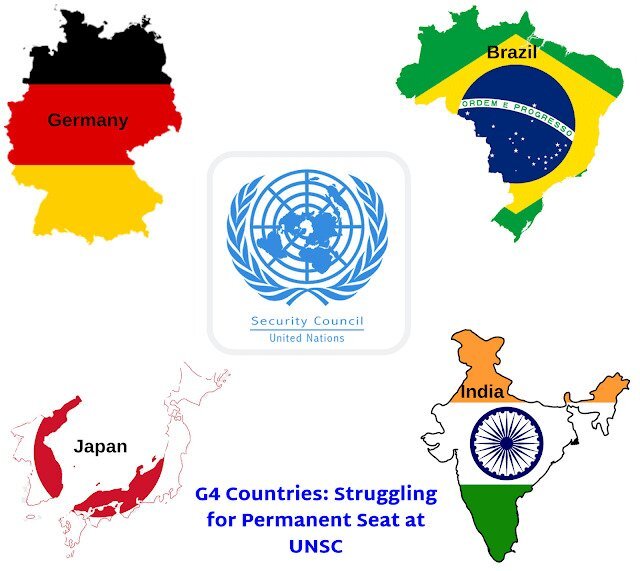GROUP OF 4 (G4) FOREIGN MEETINGS
Context
- Foreign Ministers from the Group of 4 — India, Brazil, Japan and Germany — a group that is seeking permanent membership of the UN Security Council (UNSC), met virtually to further their objective. The four countries stressed delivering concrete outcomes, in writing and within a time frame.
Key Details
- It called for a decisive push for UNSC reforms during UN75.
- Unanimous call for text-based negotiations in a fixed time frame.
- Reformed Multilateralism guides India’s approach to the United Nations.
- The Ministers reaffirmed their common resolve to “finally take decisive steps towards the early and comprehensive reform of the Security Council that was envisaged by Heads of State and Government in the 2005 World Summit.
- The G4 will work with “other reform-minded countries and groups” to start text-based negotiations (TBN) without delay and seek “concrete outcomes” during the 75th session of the UN General Assembly.
G4 and UNSC Reforms
- There is a clear need for an enhanced role of developing countries and of major contributors to the UN to make the Council more legitimate, effective and representative.
- Africa needs to be represented in both the permanent and non-permanent categories of membership of a reformed and expanded Security Council to correct the historical injustice against this continent with regard to its under-representation in the Security Council.
- This progress should also have included a reflection of the Common African Position as enshrined in the Ezulwini Consensus and the Sirte Declaration.
India and UNSC Reforms
- India, which, in January, will commence a two-year non-permanent term on the UNSC, has long sought a permanent seat at the Council and is a proponent of other UNSC reforms — such as increasing the number of permanent (currently five) and non-permanent (currently 10) seats and ensuring greater representation for Africa.
- India is a proponent of text-based negotiations at the UN.
- Those more normally resistant to UNSC reform — including China – are hesitant to have TBN for inter-governmental negotiations on the grounds that the matter is too sensitive for text.
Back to Basics
- The Ezulwini Consensus (2005) is a position on international relations and reform of the United Nations, agreed by the African Union. It calls for a more representative and democratic Security council, in which Africa, like all other world regions, is represented.
- The Sirte Declaration (1999) was the resolution adopted to establish the African Union.
About G4 Nations
- The G4 nations,comprising Brazil, Germany, India, and Japan, are four countries which support each other’s bids for permanent seats on the United Nations Security Council.
- Unlike the G7, where the common denominator is the economy and long-term political motives, the G4’s primary aim is the permanent member seats on the Security Council. Each of these four countries have figured among the elected non-permanent members of the council since the UN’s establishment.
- Their economic and political influence has grown significantly in the last decades, reaching a scope comparable to the permanent members (P5).
- However, the G4’s bids are often opposed by the Uniting for Consensus movement, and particularly their economic competitors or political rivals.
- Uniting for Consensus(UfC), nicknamed the Coffee Club, is a movement that developed in the 1990s in opposition to the possible expansion of permanent seats in the United Nations Security Council.
- Under the leadership of Italy, it aims to counter the bids for permanent seats proposed by G4 nations (Brazil, Germany, India, and Japan) and is calling for a consensus before any decision is reached on the form and size of the Security Council.

